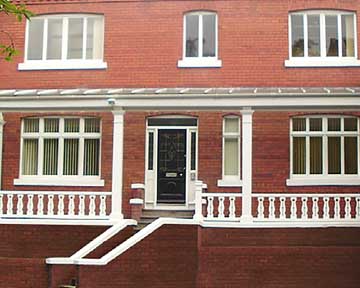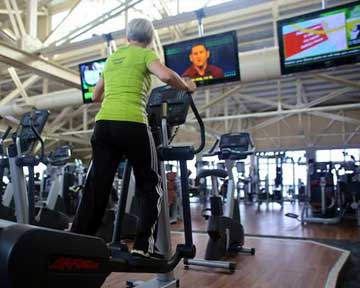Retrocalcaneal Bursitis is a common condition affecting people engaged in everyday activities as well as sports. Most minor cases can be treated conservatively with little disruption to normal activity. With the help of the specialist physiotherapists at Liverpool Physio your symptoms can be relieved and advice given to reduce the risk of reoccurrence.
The Retrocalcaneal Bursa is a small fluid filled sac that sits in the deep tissues of the heel of your foot. It lies just beneath the base of the Achilles tendon where it inserts into the Calcaneus bone of your heel. Like the numerous bursa throughout your body it is designed to reduce friction between the soft tissues and bony surfaces. Unfortunately, overuse of injury can irritate the Bursa causing inflammation characterised by swelling, redness and pain. Continual movement of the surrounding structures, in this case the Achilles tendon, can aggravate the inflammation and cause pain, inhibiting your movement.
The most common cause of Retrocalcaneal Bursitis is repetitive strain caused by overuse. It therefore most often afflicts people regularly exercising or playing sports. The regular, intensive use of the structures in the heel during running can over time trigger a mild inflammation response in the Retrocalcaneal bursa. Early signs are often overlooked until further agitation causes sufficient inflammation and pain to inhibit normal activities.
In some cases the condition is aggravated, or even caused by overly tight footwear rubbing on the heel during walking or running. This is especially noticeable during the extra stretch placed on the Achilles when switching from high heel to flat shoes.
Other causes of Retrocalcaneal Bursitis can include biomechanical abnormalities. This can range from simple muscle weakness or tightness, typically in the calf, to inefficient or poor running technique. Bad training habits such as inadequate warm ups, increasing joint stiffness, and insufficient recovery periods between sessions can also aggravate symptoms.
 Above: Our physiotherapist treating her patient for retrocalcaneal burtitis
Above: Our physiotherapist treating her patient for retrocalcaneal burtitis
Someone with Retrocalcaneal Bursitis will typically report feeling the following symptoms:
Our specialist physiotherapists at Liverpool Physio can carry out a comprehensive assessment to diagnose Retrocalcaneal Bursitis. After a discussion with you concerning your symptoms and their onset, you would receive a careful physical examination. Gait analysis can be used to assess your walking and running technique if the cause of the bursitis is believed to be biomechanical. In complex or severe cases you may be referred for a MRI, CT or Ultrasound scan to confirm the diagnosis.
For more information on how physiotherapy can help treat Retrocalcaneal Bursitis, please email office@liverpoolphysio.co.uk or ring us on 0151 558 0077.
 Above: Our therapist relieving the pressure of retrocalcaneal burtitis through a deep stretch
Above: Our therapist relieving the pressure of retrocalcaneal burtitis through a deep stretch
At Liverpool Physio, we want to gain as much information as possible about your injury to ensure we give you the best treatment. In your first appointment with us, our physiotherapists will carry out an assessment which has two parts:
A discussion between you and our physiotherapist to find out the cause of your injury and what symptoms you are experiencing, and how your injury is affecting you and your lifestyle.
An assessment of your range of pain, range of movement, and a series of special tests to identify the presence of the bursitis.
At Liverpool Physio, Our physiotherapists will ensure you specialised treatment for your Retrocalcaneal Bursitis. Depending on the severity of your injury, your treatment may involve:
At Liverpool Physio you will experience a personalised treatment session. Each appointment will be aimed at returning to your everyday activities and what you enjoy.
If you are experiencing sharp pain or swelling in your heel or foot, and feel unable to walk normally, one of our experienced physiotherapists will be happy to see you for an assessment.
You can contact us directly to arrange an assessment and we can advise you if further treatment is recommended, or give you details on self-management for minor cases. To arrange an appointment please email office@liverpoolphysio.co.uk or call 0151 558 0077.
Retrocalcaneal Bursitis is generally caused by overuse of the ankle and can easily be managed conservatively with appropriate rest and activity modification. At Liverpool Physio we can help relieve the symptoms of your condition, then advise you in how to modify your activities or training to reduce the risks of reoccurrence. Seeking our treatment early when symptoms arise will help reduce your recovery time and get you back to the activities you enjoy.
At Liverpool Physio we want to ensure you get the best treatment for your injury, and we will use tapping, strengthening exercises and activity specific treatments to help you recover.
For more information on how physiotherapy can help treat Retrocalcaneal bursitis, or to book yourself an assessment, please email office@liverpoolphysio.co.uk or ring us on 0151 558 0077.
↑ Back to top
What is Retrocalcaneal Bursitis?
The Retrocalcaneal Bursa is a small fluid filled sac that sits in the deep tissues of the heel of your foot. It lies just beneath the base of the Achilles tendon where it inserts into the Calcaneus bone of your heel. Like the numerous bursa throughout your body it is designed to reduce friction between the soft tissues and bony surfaces. Unfortunately, overuse of injury can irritate the Bursa causing inflammation characterised by swelling, redness and pain. Continual movement of the surrounding structures, in this case the Achilles tendon, can aggravate the inflammation and cause pain, inhibiting your movement.
What causes Retrocalcaneal Bursitis?
The most common cause of Retrocalcaneal Bursitis is repetitive strain caused by overuse. It therefore most often afflicts people regularly exercising or playing sports. The regular, intensive use of the structures in the heel during running can over time trigger a mild inflammation response in the Retrocalcaneal bursa. Early signs are often overlooked until further agitation causes sufficient inflammation and pain to inhibit normal activities.
In some cases the condition is aggravated, or even caused by overly tight footwear rubbing on the heel during walking or running. This is especially noticeable during the extra stretch placed on the Achilles when switching from high heel to flat shoes.
Other causes of Retrocalcaneal Bursitis can include biomechanical abnormalities. This can range from simple muscle weakness or tightness, typically in the calf, to inefficient or poor running technique. Bad training habits such as inadequate warm ups, increasing joint stiffness, and insufficient recovery periods between sessions can also aggravate symptoms.
 Above: Our physiotherapist treating her patient for retrocalcaneal burtitis
Above: Our physiotherapist treating her patient for retrocalcaneal burtitisWhat are the symptoms of Retrocalcaneal Bursitis?
Someone with Retrocalcaneal Bursitis will typically report feeling the following symptoms:
- Pain in the heel, localised to the back of the heel just above the bone.
- The back of the heel feels tender or painful when firmly pressed.
- Swelling, redness or even a lump may be visible at the back of the heel.
- Activities such as running or prolonged walking aggravate the pain.
- Tight fitting footwear worsens the symptoms.
- Overstretching the Achilles, such as walking uphill, increases the symptoms.
- Symptoms feel worse after a period of rest, until it has ???warmed up???.
How is Retrocalcaneal Bursitis Diagnosed?
Our specialist physiotherapists at Liverpool Physio can carry out a comprehensive assessment to diagnose Retrocalcaneal Bursitis. After a discussion with you concerning your symptoms and their onset, you would receive a careful physical examination. Gait analysis can be used to assess your walking and running technique if the cause of the bursitis is believed to be biomechanical. In complex or severe cases you may be referred for a MRI, CT or Ultrasound scan to confirm the diagnosis.
For more information on how physiotherapy can help treat Retrocalcaneal Bursitis, please email office@liverpoolphysio.co.uk or ring us on 0151 558 0077.
 Above: Our therapist relieving the pressure of retrocalcaneal burtitis through a deep stretch
Above: Our therapist relieving the pressure of retrocalcaneal burtitis through a deep stretchWhat would a physiotherapy assessment for Retrocalcaneal Bursitis involve?
At Liverpool Physio, we want to gain as much information as possible about your injury to ensure we give you the best treatment. In your first appointment with us, our physiotherapists will carry out an assessment which has two parts:
Subjective
A discussion between you and our physiotherapist to find out the cause of your injury and what symptoms you are experiencing, and how your injury is affecting you and your lifestyle.
Objective
An assessment of your range of pain, range of movement, and a series of special tests to identify the presence of the bursitis.
What would physiotherapy treatment for Retrocalcaneal Bursitis?
At Liverpool Physio, Our physiotherapists will ensure you specialised treatment for your Retrocalcaneal Bursitis. Depending on the severity of your injury, your treatment may involve:
- Joint mobilisations of the ankle and lower limb.
- Ice treatments.
- Heat treatments.
- Soft tissue massage.
- Achilles tendon taping.
- Stretching of the ankle and lower limb.
- Strengthening and balance exercises.
- Balance exercises.
- Advice on activity modification.
- Footwear advice, including use or wedges and orthotics.
- Biomechanical correction of movement and training techniques.
At Liverpool Physio you will experience a personalised treatment session. Each appointment will be aimed at returning to your everyday activities and what you enjoy.
How can I arrange a physiotherapy assessment for Retrocalcaneal Bursitis?
If you are experiencing sharp pain or swelling in your heel or foot, and feel unable to walk normally, one of our experienced physiotherapists will be happy to see you for an assessment.
You can contact us directly to arrange an assessment and we can advise you if further treatment is recommended, or give you details on self-management for minor cases. To arrange an appointment please email office@liverpoolphysio.co.uk or call 0151 558 0077.
Summary
Retrocalcaneal Bursitis is generally caused by overuse of the ankle and can easily be managed conservatively with appropriate rest and activity modification. At Liverpool Physio we can help relieve the symptoms of your condition, then advise you in how to modify your activities or training to reduce the risks of reoccurrence. Seeking our treatment early when symptoms arise will help reduce your recovery time and get you back to the activities you enjoy.
At Liverpool Physio we want to ensure you get the best treatment for your injury, and we will use tapping, strengthening exercises and activity specific treatments to help you recover.
For more information on how physiotherapy can help treat Retrocalcaneal bursitis, or to book yourself an assessment, please email office@liverpoolphysio.co.uk or ring us on 0151 558 0077.
↑ Back to top
















